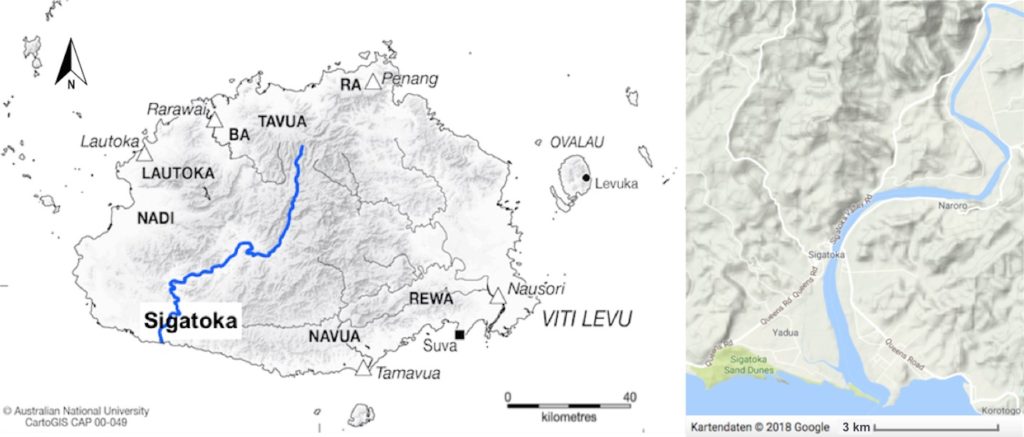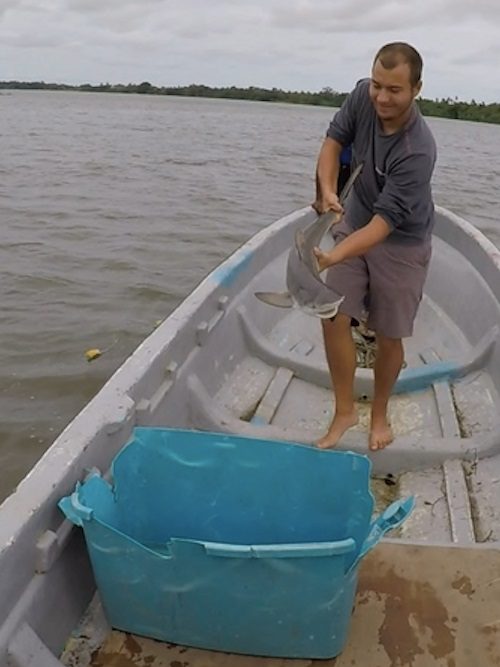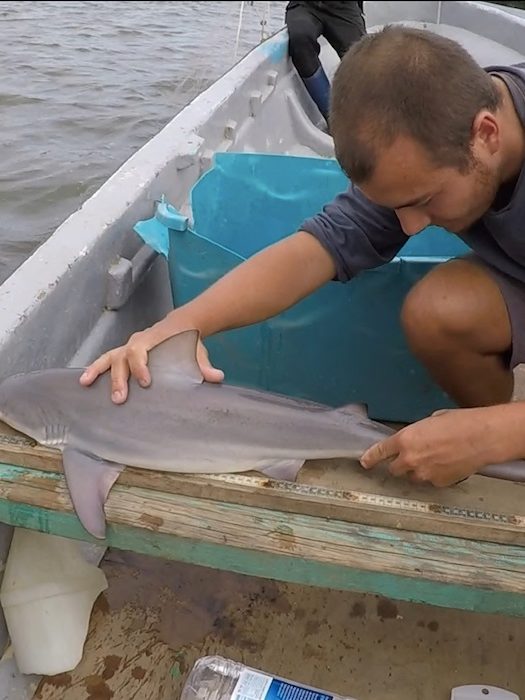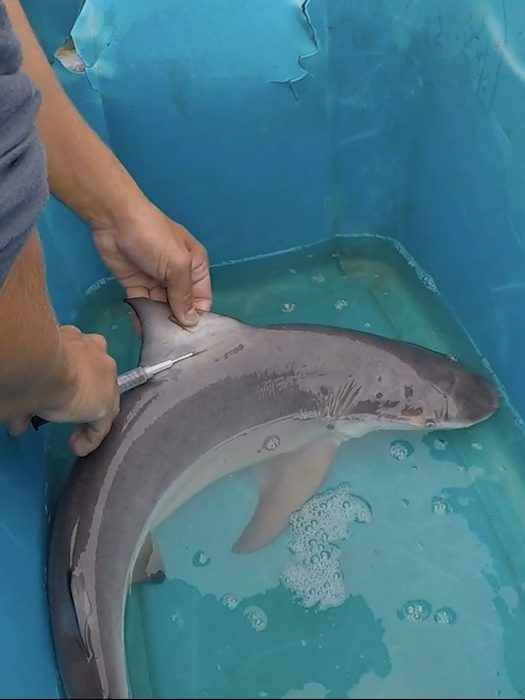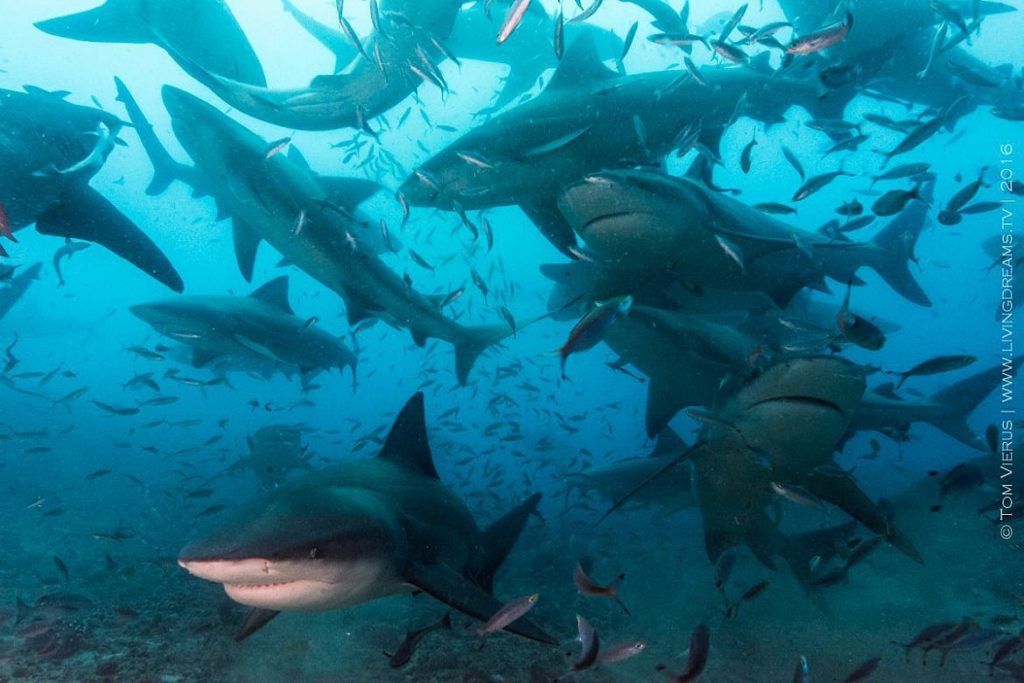I never would have thought that my graduate research at ETH Zurich would lead to skipping a Swiss winter to go fishing for bull sharks in a tropical paradise.
For the past four months, I have been living the dream. As a part of my Master’s program in Environmental Sciences, I had the fantastic opportunity to join the School of Marine Studies at the University of the South Pacific (USP) as an intern. Based in Sigatoka, my mission was to confirm the presence of newborn bull sharks (Carcharhinus leucas) in the Sigatoka river located on the southern coast of Fiji’s main island Viti Levu.
Together with an experienced fishermen, I played the exciting game of “catch and release” with bull sharks in the local river estuary. Equipped with a 150×3.5m gill net and a set of longlines we went fishing sometimes as far as 10km upstream of the mouth of the Sigatoka river. Based on local recommendations, we dropped our net and lines at low tide – assuming that the upstream movements of juvenile bull sharks coincide with incoming tides.
We deposited every shark that we caught into an on board tank, measured its length, and tagged it with a Passive Integrated Transponder (PIT tag). PIT tags track individual sharks with a lifetime bar code. Finally, before releasing them back into the river, we took a small tissue sample from the dorsal fin for further DNA kinship analysis. The whole procedure took no longer than about a minute and presented no harm to the sharks. In addition to the bull sharks, we also caught juvenile scalloped hammerhead sharks (Sphyrna lewini), listed on the IUCN red list as an endangered species, and an interesting variety of fish. The excitement was real every time we checked the net and lines.
Bull sharks thrive in Fiji’s fresh water estuaries
The bull shark is circumglobally distributed in tropical and subtropical waters. This apex predator occupies a variety of different habitats, with a preference for nearshore areas. Adult bull sharks can reach a size of up to 4m in length with females growing larger than the males. They are one of few shark species known to thrive both in fresh and marine water.
Bull sharks occur in high numbers in the Shark Reef Marine Reserve (SRMR), a national marine park located off the southern coast of Viti Levu. Towards the end of a calendar year, researchers observed that the adults vanish from the reef and do not return until early the following year. During these months, bull sharks are believed to leave the area for reproductive activity, but parturition sites are still unknown. Researchers hypothesize that neonate bull sharks spend the first years of their lives in the fresh water rivers of Fiji.
Females reach sexual maturity at the age of 18 and give birth to up to 13 pups every two years. Even low level fishing activities – although not targeting bull sharks directly – can threaten the survival of the species in the coastal areas of Fiji. Even though bull sharks are not a species targeted by fishermen, the fact that young bull sharks thrive in fresh water rivers makes them vulnerable to over-fishing. Anecdotal evidence suggests that local fishermen catch juvenile bull sharks in high numbers during the first months of their life in Viti Levu. In order for a comprehensive conservation system to work, we need to protect all stages in the bull shark’s life cycle. However, parturition sites and nursery areas for bull sharks in Fiji remain largely elusive. I hope that the data I have gathered will eventually help to develop measures to protect these areas.
Cultural challenges of island research
The lessons learned through my daily interactions in Fiji – still a developing country – somehow seemed much more significant than the research techniques that I learned. I discovered that my expectations for reliability and time management – common among my Swiss colleagues – differ significantly from the expectations of Fijian villagers. For example, my first challenge in the internship was to organize a new boat, hire a new crew, and coordinate with local authorities and village chiefs in order to obtain permission to fish in ‘their’ river – the previous boat had been damaged and the captain’s fishing license had lapsed. I learned to make contingency plans, in the case that something went wrong. Instead of panicking when something went wrong, I learned to solve problems efficiently. This internship not only enhanced my knowledge of marine research and conservation, but also allowed me to grow personally developing precious abilities to master future challenges.
New publication
Pascal Flükiger, Jürg Brunnschweiler and five other researchers published in June 2019 a paper about their research on young bull sharks.
By Pascal Flükiger
Pascal Flükiger is enrolled as an Environmental Science MSc student at ETH Zurich. As part of this Master’s programme, he spent four and a half months in Sigatoka, Fiji where he did an internship at the University of the South Pacific.


